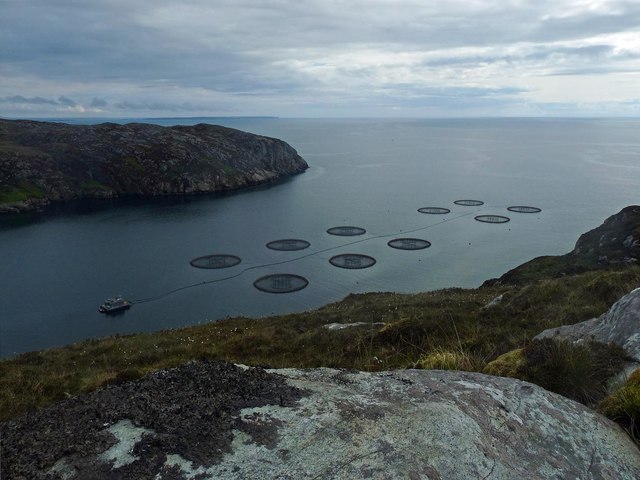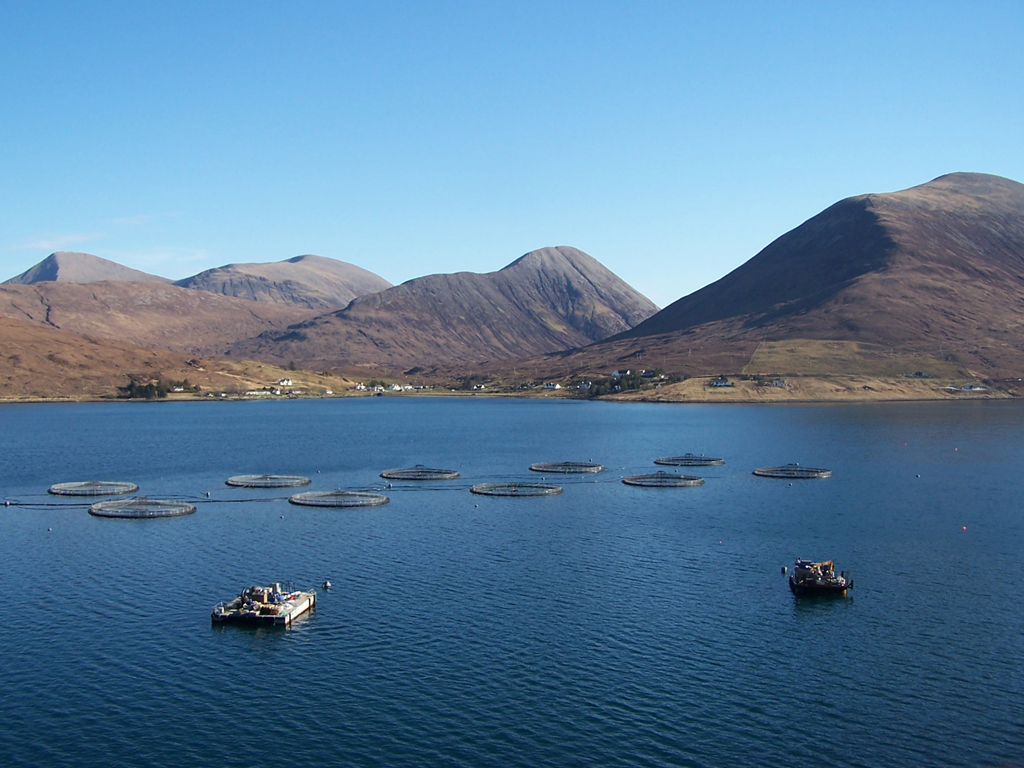Council decisions to reject new fish farms in protected beauty spots were overruled by the Scottish Government after appeals by multinationals, prompting critics to claim the system is “stacked in favour” of fish farms and ignores local democracy.
Since the end of March 2017, the government approved four of seven fish farming developments in the Highlands and Islands which had been previously refused by local authorities, according to data we obtained under freedom of information.
Councils had thrown out the bids due to marine pollution risks and potential impacts on views, birds, wild fish, shellfish, sea beds, boat navigation and water quality. But fish farming firms used the appeals process, which allows those seeking planning permission to have government reporters reassess rejected bids.
Campaigners claimed the planning process was “stacked in favour” of fish farms”. They accused SNP and Green ministers of breaking manifesto commitments to empower local communities by “seeking to remove” their “meagre powers”.
The Greens said it was vital that local people and councils were “meaningfully consulted and listened to”. The party has called for a moratorium on new fish farms, which, it claims, “can have very severe impacts on local marine environments and biodiversity.”
The government claimed Scotland has some of the world’s strongest environmental regulations and a “robust planning and consenting system” that considers the views of local communities, and of which the right to appeal “remains an important part”.
Fish farm application brought to the government on appeal
| Date case received | Applicant Name | Site Address | Case detail | Date decision issued | Decision Description | |
|---|---|---|---|---|---|---|
| 28/02/2018 | Scottish Sea Farms Ltd | Hunda North, Scapa Flow, Orkney, KW17 2SX | New salmon farm with 12 cages and feed barge | 09/04/2019 | Appeal Allowed | |
| 18/04/2018 | Marine Harvest (Scotland) Ltd | Site 2130M East Of Sconser Quarry, Sconser, Isle Of Skye, IV48 8TD | New fish farm with 12 cages and feed system | 29/11/2018 | Appeal Allowed | |
| 29/10/2019 | The Scottish Salmon Company | North Aird, Ardheslaig, Loch Shieldaig, IV54 8XH | New salmon farm with four cages | 27/10/2020 | Appeal Allowed | |
| 13/09/2022 | MOWI Scotland Limited | Loch Hourn, Arnisdale, PH41 | Reduction from 12 to 8 pens, with more fish and relocation of feed barge | 20/12/2022 | Appeal Allowed | |
| 20/03/2020 | Organic Sea Harvest | Land 1520 M Ne Of Bridgend Cottage, Flodigarry, Portree, IV51 9HZ | New salmon farm with 12 cages, a mooring grid and feed barge | 26/11/2020 | Appeal Dismissed | |
| 26/04/2021 | Organic Sea Harvest | Land 1600M East Of Balmaqueen, IV51 | New salmon farm with 12 cages, a mooring grid and feed barge | 07/10/2021 | Appeal Dismissed | |
| 22/06/2021 | The Scottish Salmon Company | Site To The East Of Millstone Point, Lochranza, Brodick, Isle Of Arran, KA27 8HH | New salmon farm with 12 cages and feed barge | 09/11/2021 | Appeal Dismissed |
Some government-approved developments were in specially recognised or protected scenic and conservation areas. These included those in Orkney’s Scapa Flow, the Inner Hebrides and the Minches, Wester Ross and the River Kerry in Gairloch. In one case, the government approved a fish farm that attracted 155 recorded objections, compared to 57 in support.
In each granted appeal, government reporters cited evidence – including from environment and wildlife regulators – to justify their view that negative impacts would be contained. They approved the fish farms with conditions, and argued they would create local jobs and have wider economic benefits.
The government also backed three council decisions to block fish farms, citing potential impacts on views, wildlife, tourism, and local communities. This included a proposed fish farm in Arran which saw 374 local objections, with just 22 in support.

Fish farms and local democracy
One appeal decision stated that “national policy provides clear support for the expansion of fish farming, provided this takes place sustainably and in suitable locations.”
In 2018, the government agency Marine Scotland launched its 2030 Aquaculture Strategy, which aimed to double the economic contribution of the industry by 2030, create over 9,000 new jobs and establish Scotland as a global leader in the industry.
A 2022 independent review of the sector suggested councils could “give up” fish farm planning rights to Marine Scotland, and simply be consultees instead.
The Greens’ Ariane Burgess MSP called the review “worrying”. “This kind of flawed thinking and centralising attitude should concern communities and councils as it removes that local perspective and voice,” she added.
Corin Smith, who runs the Inside Scottish Salmon Feedlots website, said communities were encouraged to “make their own decisions right up to the point they do something the Scottish Government doesn’t like.”
Council planners were set to be “replaced with unaccountable Edinburgh-based agencies like Marine Scotland that have a stated mission to enable a doubling of this grossly polluting industry”, he claimed.
John Aitchison of the Coastal Communities Network, which is made up of 24 local groups across Scotland, said: “The Scottish Government says that it wants to encourage local democracy – here’s a great opportunity to prove that they mean it, by letting the local communities who know their own waters better than multinational companies or Marine Scotland, decide whether places are appropriate for industrial fish farming.”
Clare Symonds from Planning Democracy said planners assessing new fish farm applications must “ensure that they give far greater weight to preventing biodiversity loss and don’t just look at claims for economic growth. Nature is as much in the long term public interest as jobs and it’s often local communities who are standing up for the environment.”
But Tavish Scott, chief executive at Salmon Scotland, said: “We’re in the absurd position where anti-salmon farming campaigners are complaining about the Scottish Government approving planning applications, and at the same time calling for the Scottish Government to intervene to overturn local decisions.
“The truth is these people don’t care who decides as long as the answer is ‘no’.”
The WildFish charity slammed the “deeply flawed” application process”. “The reporter for any appeal is appointed by ministers, and so can hardly be considered to be an independent adjudicator,” a spokesperson argued.
The Scottish Government said it had made 172 planning appeal decisions in the last financial year, compared to 27,000 by councils, of which 94.5 per cent were granted.
“The majority of planning appeals are decided by independent reporters on the planning merits of the case and in accordance with the development plan, unless material considerations indicate otherwise,” a spokesperson said.
Bakkafrost said Salmon Scotland would comment on its behalf. Organic Sea Harvest declined to comment. No other firms named in this article responded to requests to comment.
Header image: Richard Dorrell / Loch Ainort fish farm / CC BY-SA 2.0















SEPA is currently wanting to approve a CAR licence for the refused Millstone Point farm. This is perverse. After a planning refusal and a dismissed appeal, the local authority and the Scottish Government have clearly stated that this site is not suitable for a fish farm. yet SEPA is actively seeking to undermine this decision, this is disgraceful behaviour. What happened to joined up government?
Could it be that SEPA has a financial interest in granting approvals? A regulator that is encouraged to generate income through its licence system?